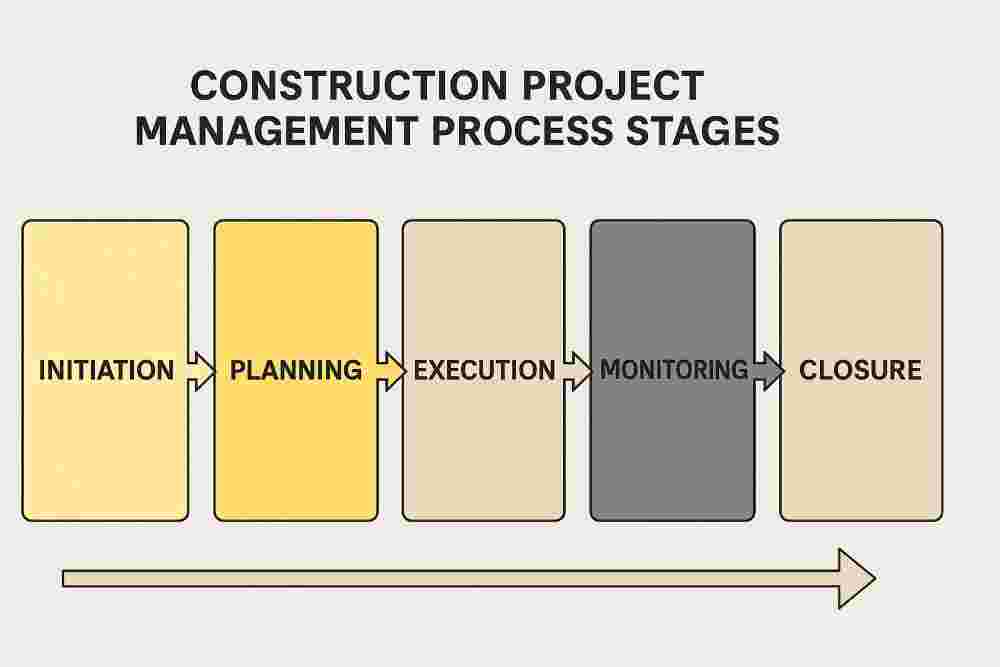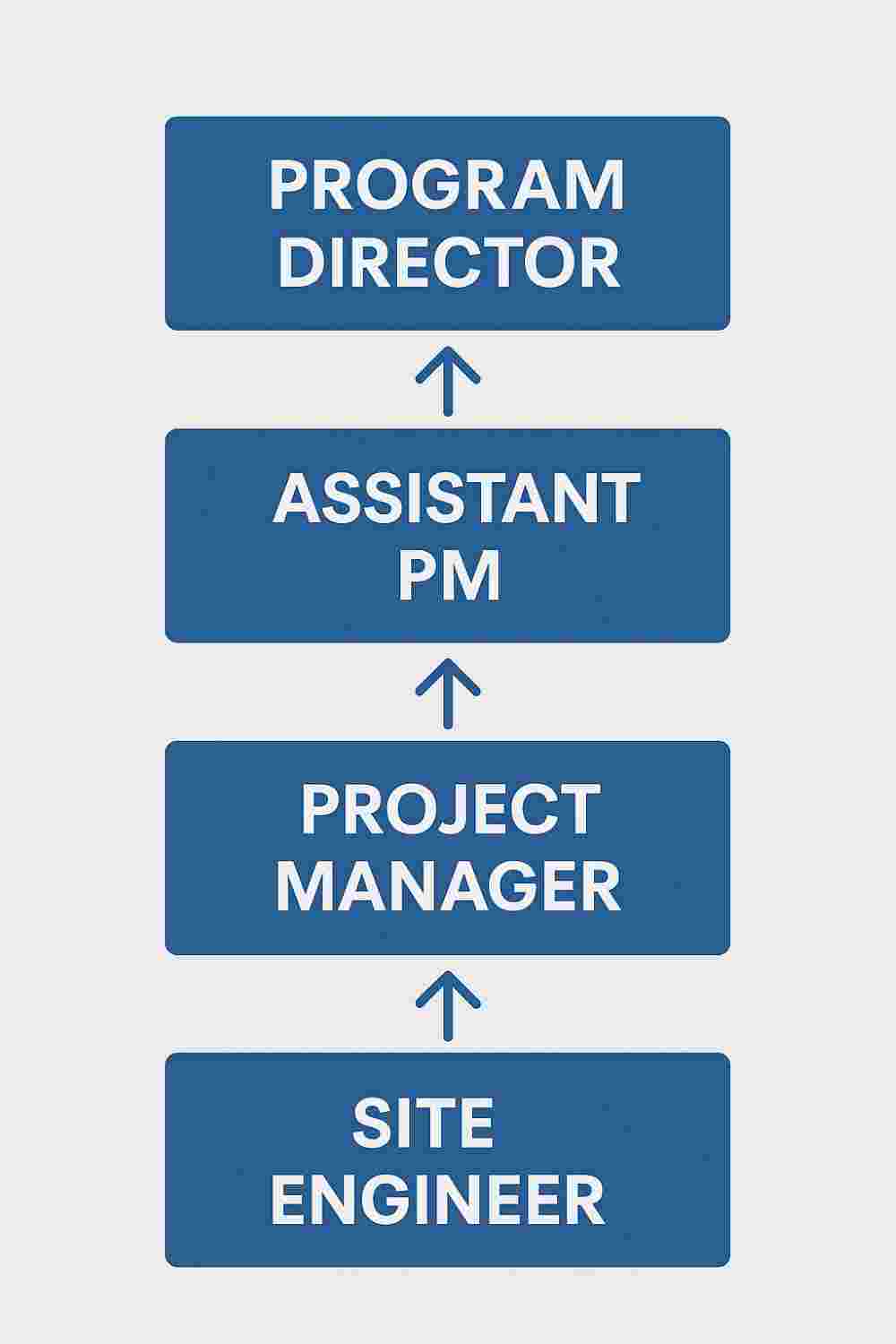Last Updated on October 7, 2025 by Admin
Looking to build a rewarding career at the intersection of engineering, business, and leadership? Construction project management offers competitive salaries, strong job growth, and the satisfaction of transforming blueprints into tangible structures that shape our communities.
ConstructionCareerHub App is LIVE — built ONLY for construction careers. Don’t apply with a weak resume.
Get ATS-ready Resume Lab + Interview Copilot + Campus Placement Prep (resume screening, skill gaps, interview readiness) — in minutes & Other advanced features.
Explore Smarter Construction Career Tools →Quick check. Big impact. Start now.
The construction project management profession sits at a pivotal crossroads where technical expertise meets strategic leadership. As project managers, these professionals orchestrate every phase of construction—from initial design concepts and permit acquisitions to final inspections and client handovers—ensuring projects are delivered on time, within budget, and to exacting quality standards.
With governments worldwide investing heavily in infrastructure modernization and private developers racing to address housing shortages, renewable energy targets, and climate resilience requirements, the demand for capable construction project managers has never been stronger.
According to the U.S. Bureau of Labor Statistics (BLS), construction managers earned a median annual salary of $106,980 ($51.43 per hour) in May 2024, with employment projected to grow 9% between 2024 and 2034—nearly double the average for all occupations. This growth translates to more than 48,000 new positions entering the market.
The trend isn’t limited to North America. In the United Kingdom, the newly qualified project managers typically earn around £34,000 annually, while seasoned professionals command salaries exceeding £87,000.
This comprehensive 2025 guide examines the responsibilities, essential skills, educational pathways, salary benchmarks, and emerging trends shaping construction project management careers. Whether you’re considering entering the field or looking to advance your existing career, this resource provides the insights you need to succeed.
Table of Contents
What is Construction Project Management?
Construction project management encompasses the planning, coordination, and oversight of all facets of a construction project to achieve a client’s objectives. As Indeed defines it, the discipline involves managing scope, cost, quality, and time from pre-construction through project completion.
The breadth of construction projects is substantial and includes:
- Residential developments – Single-family homes, multi-unit apartments, and townhouse complexes
- Commercial and institutional buildings – Office towers, hospitals, educational facilities, and retail centers
- Heavy industrial projects – Energy generation facilities, manufacturing plants, and processing centers
- Infrastructure and civil engineering works – Bridges, highways, water treatment facilities, and transportation networks
The Six Core Stages of Project Management
Construction project managers typically guide projects through six interconnected phases:
- Design and Feasibility – Clarifying project objectives, developing conceptual and schematic designs, conducting site analysis, and preparing preliminary plans
- Planning – Finalizing project scope, creating detailed schedules, developing comprehensive budgets, and establishing risk management protocols
- Procurement – Soliciting competitive bids, negotiating contracts with subcontractors, ordering materials, and securing specialized services
- Execution – Overseeing daily construction activities, coordinating multiple trades, managing workforce resources, and addressing on-site challenges
- Commissioning and Handover – Verifying system functionality, conducting thorough inspections, addressing punch-list items, and facilitating client acceptance
- Project Close-Out – Conducting lessons-learned reviews, preparing final documentation, archiving project records, and capturing best practices for future initiatives

Key Roles and Responsibilities
A construction project manager operates as the central hub connecting clients, architects, engineers, contractors, and regulatory authorities. Texas A&M University highlights that these professionals guide project initiation, procurement strategies, and post-construction evaluations.
The following ten responsibilities represent the core duties synthesized from industry sources:
1. Planning and Budgeting
Develop detailed cost estimates, establish realistic timetables, create work breakdown structures, and collaborate with design professionals to produce comprehensive project plans. This foundational work sets the trajectory for project success.
2. Subcontractor Selection and Management
Vet potential subcontractors and suppliers, negotiate favorable contract terms, and ensure selected partners can meet quality benchmarks and schedule commitments while maintaining cost efficiency.
3. Cost and Schedule Control
Monitor budgets with precision, track schedule adherence, process change orders efficiently, analyze labor and material costs, and manage contingency reserves to prevent overruns.
4. Permitting and Regulatory Compliance
Secure all necessary building permits, ensure adherence to safety regulations, maintain environmental compliance, and navigate complex building codes across multiple jurisdictions.
5. Team Leadership and Coordination
Assemble and lead multidisciplinary teams, assign clear roles and responsibilities, coordinate diverse subcontractors, and foster collaborative environments that drive project momentum.
6. Communication and Stakeholder Reporting
As the primary point of contact, project managers provide regular progress updates to owners, contractors, and stakeholders, resolve conflicts diplomatically, and maintain transparent communication channels.
7. Quality Control and Assurance
Ensure construction work meets design specifications and quality standards, conduct systematic inspections, identify deficiencies, and enforce corrective actions promptly.
8. Risk Management
Identify potential project risks proactively, develop comprehensive mitigation strategies, and manage issues, including schedule delays, cost escalations, and safety incidents, before they escalate.
9. Health and Safety Management
Implement robust safety plans, conduct regular site inspections, enforce proper use of personal protective equipment, and cultivate a zero-injury culture across all project activities.
10. Project Close-Out and Documentation
Commission building systems, secure occupancy certificates, produce final as-built documentation, and conduct comprehensive lessons-learned sessions to capture insights for continuous improvement.
These responsibilities demand exceptional organizational capabilities and the ability to coordinate diverse stakeholders under compressed timelines and budget constraints.
Essential Skills and Professional Attributes
Successful construction project managers combine technical proficiency with strong leadership capabilities and refined interpersonal skills. The profession requires a unique blend of hard and soft competencies.
Technical Skills
Texas A&M emphasizes a comprehensive skill set, including:
- Financial Management – Developing accurate cost estimates, controlling cash flow, conducting life-cycle cost analyses, and managing project finances with precision
- Scheduling Software Proficiency – Expertise in Primavera P6, Microsoft Project, and BIM-integrated scheduling platforms to manage complex timelines
- Legal and Regulatory Knowledge – Understanding zoning regulations, procurement requirements, contract law, and evolving building codes
- Construction Methods and Engineering Principles – Knowledge of structural systems, material properties, construction sequencing, and site logistics optimization.
- Document Management – Maintaining organized project records, managing RFIs (Requests for Information), and ensuring documentation completeness
- Contract Negotiation – Securing favorable terms while maintaining professional relationships with contractors and suppliers
Soft Skills and Leadership Qualities
Technical expertise alone doesn’t guarantee success. Industry leaders consistently emphasize these interpersonal capabilities:
- Active Listening and Emotional Intelligence – Understanding stakeholder concerns, reading team dynamics, and responding with empathy
- Problem-Solving and Critical Thinking – Analyzing complex situations, evaluating alternatives, and making informed decisions under pressure
- Leadership and Team Motivation – Inspiring teams, delegating effectively, and maintaining morale through challenging project phases
- Clear Communication – Articulating technical concepts to non-technical stakeholders and ensuring all parties understand project requirements
- Attention to Detail – Catching potential issues before they become problems and maintaining quality throughout execution
- Persistence and Initiative – Driving projects forward despite obstacles and proactively addressing emerging challenges
- Integrity and Ethical Decision-Making – Building trust with clients and maintaining professional standards in all interactions
Education and Professional Credentials
Degree Programs and Training Pathways
Bachelor’s Degree
The Bureau of Labor Statistics notes that most construction managers hold bachelor’s degrees in construction management, construction science, civil engineering, or related fields. These programs typically cover:
- Project scheduling and critical path methodology
- Cost estimating and budget management
- Construction safety and OSHA compliance
- Building codes and regulatory frameworks
- Contract administration and procurement
- Construction materials and methods
Alternative Entry Routes
Not everyone follows the traditional degree pathway. Also, the alternative routes include apprenticeships, starting in assistant or coordinator positions, or advancing from trade positions. Many successful managers begin their careers as laborers, carpenters, or electricians, gaining invaluable field experience before transitioning into management.
Advanced Degrees
A master’s degree in construction management, civil engineering, or business administration can accelerate advancement into senior leadership roles. Texas A&M’s Master of Science program, for example, emphasizes leadership development and emerging construction technologies.
Related Courses:
- Sustainable Construction Management
- Virtual Building Design for Engineers Using Autodesk Revit
- Construction Management Specialization by The University of Maryland
- The Industry and Profession in Construction Management
Professional Certifications and Licenses
Professional certifications validate expertise and can significantly boost earning potential. Here are the most recognized credentials:
| Certification | Issuing Organization | Key Benefits |
|---|---|---|
| Certified Construction Manager (CCM) | Construction Management Association of America (CMAA) | Recognizes mastery of construction management practices; requires documented experience and a comprehensive examination |
| Project Management Professional (PMP) | Project Management Institute (PMI) | Demonstrates project management expertise applicable across construction and other industries; globally recognized credential |
| Chartered Status | Association for Project Management (APM) or Chartered Management Institute (CMI) | Prestigious UK-based credentials that enhance salary prospects and professional standing |
| Certified Professional Constructor (CPC) | American Institute of Constructors (AIC) | Validates comprehensive knowledge of construction operations and safety management |
| CSCS Card (UK) | Construction Skills Certification Scheme | Required for site access in the UK; confirms health and safety training compliance |
Depending on jurisdiction, managers may also require general contractor licenses or professional engineer registration.
Salary Ranges, Top-Paying Locations, and Job Outlook
Comprehensive Salary Analysis
Construction project management offers robust compensation that increases substantially with experience and specialization.
United States Market
The Bureau of Labor Statistics reports a median annual salary of $106,980 for construction managers as of May 2024. However, the range is considerable. Indeed’s comprehensive salary analysis shows typical earnings of $85,562, with entry-level positions starting around $24,000 and top earners exceeding $183,000.
United Kingdom Market
In the UK, newly qualified project managers earn approximately £34,000 annually, while experienced professionals with specialized expertise can command upwards of £87,000, according to industry data.
Related Positions
Cost estimators, a closely related role, earned an average of $87,576 in 2023. Notably, wage disparities persist, with male estimators averaging $92,110 compared to $64,878 for female estimators—highlighting ongoing equity challenges in the construction sector.
Highest-Paying States and Specialized Sectors
Geography significantly impacts earning potential. According to a 2025 analysis by Zippia, the top-paying states for construction managers are:
- Hawaii – Average salary: $123,933
- California – Average salary: $101,370
- Washington – Average salary: $93,188
- Oregon – Average salary: $90,241
- Nevada – Average salary: $89,451
Industry specialization also affects compensation. The electric and gas utilities sector pays the highest wages for construction professionals, with cost estimators in this industry earning approximately $144,706 annually. States with the highest average wages for cost estimators include the District of Columbia ($150,380), Connecticut ($110,679), and Maine ($107,581).
These figures underscore the substantial earning potential when managing complex infrastructure, energy, or industrial projects.
Job Market Outlook Through 2034
Key Takeaway: The BLS projects 9% employment growth for construction managers between 2024 and 2034—approximately twice the national average for all occupations. This translates to roughly 38,700 job openings annually, driven by both new positions and workforce replacements.
Multiple factors fuel this robust demand:
- Infrastructure Investment – Federal and state governments are committing billions to modernize aging infrastructure, including roads, bridges, and water systems
- Housing Demand – Population growth and urbanization continue driving residential construction
- Renewable Energy Expansion – The transition to clean energy requires massive construction of solar farms, wind facilities, and grid infrastructure
- Healthcare and Educational Facilities – Growing populations necessitate new hospitals, schools, and institutional buildings
- Workforce Retirements – Baby boomer retirements create advancement opportunities for mid-career professionals

Career Path and Advancement Opportunities
Construction project management offers a flexible and rewarding career trajectory with multiple specialization options.
Typical Career Progression
Early Career (0-3 years)
- Assistant Project Manager
- Project Coordinator
- Scheduler
- Quantity Surveyor
- Site Engineer
Mid-Career (3-8 years)
- Project Manager
- Senior Project Manager
- Construction Superintendent
- Contracts Manager
Senior Leadership (8+ years)
- Project Director
- Program Manager
- Vice President of Construction
- Director of Construction Operations
- Chief Operating Officer
Specialization Options
As careers progress, many professionals develop expertise in specialized areas:
- Digital Project Management – Focusing on BIM, AI, and construction technology implementation
- Sustainable/Green Building – Specializing in LEED certification and environmentally conscious construction
- Healthcare Construction – Managing complex medical facility projects with stringent regulatory requirements
- Heavy Civil/Infrastructure – Overseeing large-scale transportation, water, and utility projects
- Safety Management – Developing expertise in occupational health and construction safety
The skills acquired in construction management are highly transferable, enabling lateral moves into architectural management, engineering oversight, property development, or consulting roles.

Why Choose a Career in Construction Project Management?
Beyond competitive compensation and strong job security, construction project management offers unique professional rewards that distinguish it from other career paths.
1. Exceptional Earning Potential
Construction management offers robust salaries that grow substantially with experience. Industry experts at Murow Development Consultants note that skilled project managers are major organizational assets, resulting in compensation packages that provide comfortable living standards and financial security.
2. Tangible, Rewarding Outcomes
Few careers offer the satisfaction of pointing to a completed building, bridge, or facility and saying, “I built that.” Managing a project from initial concept through completion provides immense personal fulfillment. The thrill of delivering a complex structure on schedule and within budget creates a sense of accomplishment that desk-bound careers rarely match.
3. Daily Variety and Intellectual Challenge
No two days are identical in construction management. One morning might involve reviewing structural drawings, while the afternoon requires mediating subcontractor disputes or solving unexpected site challenges. This variety—supervising concrete pours, coordinating deep excavation, or managing multi-story erection—keeps the work intellectually stimulating and prevents monotony.
4. Broad, Transferable Skill Development
Construction managers develop a unique cross-disciplinary education. Running a project requires understanding engineering principles while simultaneously coordinating teams, managing finances, and navigating regulatory requirements. These diverse skills open doors across multiple industries, from real estate development to facilities management to consulting.
5. Balanced Office and Field Experience
The role bridges office planning and field execution. Project managers divide time between desk-based scheduling and budgeting, and hands-on problem-solving at job sites. This blend offers professionals who dislike being desk-bound all day or exposed to the elements constantly a ideal middle ground.
6. Meaningful Societal Impact
As Texas A&M emphasizes, construction professionals literally shape where people live, work, and spend leisure time. Building safe, comfortable, and sustainable spaces leaves a lasting positive legacy in communities. Whether constructing affordable housing, modern hospitals, or renewable energy infrastructure, project managers contribute meaningfully to societal well-being.
Challenges and Strategic Solutions
While rewarding, construction project management presents genuine challenges that require resilience and strategic thinking.
Common Industry Challenges
- Extended Work Hours – Project deadlines often necessitate working beyond standard 40-hour weeks, including evenings and weekends. Emergency situations may require immediate on-site presence
- Physical Demands and Site Conditions – Job sites can be hazardous environments with exposure to weather, noise, and physical risks
- High-Pressure Decision Making – Managers must make consequential decisions quickly, often with incomplete information
- Stakeholder Management – Balancing competing demands from owners, contractors, regulators, and communities requires diplomatic skill
- Budget and Schedule Pressures – Delivering projects within aggressive constraints creates constant performance pressure
Effective Mitigation Strategies
- Master Time Management – Utilize advanced scheduling tools, delegate effectively, and prioritize high-impact activities
- Prioritize Safety Culture – Implement comprehensive safety plans, enforce training requirements, and empower workers to report hazards without fear
- Communicate Transparently – Maintain open channels with all stakeholders, address issues proactively, and manage expectations realistically
- Commit to Continuous Learning – Stay current with evolving building codes, emerging technologies, and industry best practices through courses and certifications
- Practice Work-Life Balance – Establish boundaries, exercise regularly, pursue hobbies, and build support networks to manage stress effectively
Future Trends Reshaping Construction Project Management
2025 and Beyond: The construction industry stands at the precipice of technological transformation. Project managers who embrace these innovations will lead the profession into its next era.
1. Generative AI in Design and Planning
CMiC reports that generative AI is revolutionizing design processes by producing multiple design alternatives based on parameters including function, cost, sustainability, and aesthetic preferences. This technology streamlines the creative process, enables architects and engineers to explore exponentially more possibilities, reduces human error, and accelerates project timelines while cutting costs. Construction spending on AI tools continues rising as firms recognize competitive advantages.
2. 3D Printing and Advanced Prefabrication
Three-dimensional printing technology can now produce customized building components or even entire structures, dramatically reducing material waste and enabling faster, more sustainable construction methods. Combined with modular prefabrication techniques, these approaches shorten construction schedules, minimize site disruption, and improve quality control through factory-controlled environments.
3. Building Information Modeling (BIM) Integration
BIM creates comprehensive digital representations of buildings, revolutionizing collaboration among architects, engineers, and contractors. Teams can identify conflicts and resolve issues during the design phase—before expensive construction begins. BIM adoption has become standard practice, driving faster timelines, lower costs, enhanced sustainability, and improved facility management throughout a building’s lifecycle.
4. Digital Transformation and IoT Deployment
Expect accelerated adoption of smart sensors, wearable technology, autonomous drones, and Internet-of-Things (IoT) solutions for real-time data collection and analysis. These technologies enable predictive maintenance, enhance worker safety through wearable monitors, improve equipment utilization, and provide project managers with unprecedented visibility into field operations.
5. Sustainability and Green Building Mandates
Construction is rapidly embracing eco-friendly materials, net-zero energy buildings, circular economy principles, and comprehensive recycling practices. The industry will see increased utilization of recycled materials, energy-efficient HVAC systems, renewable energy integration, and sustainable site management. Green building certifications like LEED and WELL are becoming baseline requirements rather than premium options.
6. Worker Health, Wellbeing, and Biophilic Design
Post-pandemic awareness has elevated focus on occupant health. Contemporary designs emphasize enhanced ventilation systems, abundant natural lighting, biophilic elements (incorporating nature into built environments), and spaces that promote physical and mental wellbeing. This trend extends to construction workers as well, with improved site facilities and health monitoring.
7. Innovative Materials and Smart Technologies
Emerging materials, including self-healing concrete, transparent aluminum, cross-laminated timber, and smart glass, will transform construction durability and reduce environmental impact. These innovations extend building lifespans, decrease maintenance requirements, and enhance energy efficiency.
8. Workforce Development and Diversity Initiatives
Persistent skilled labor shortages and the imperative for diverse, inclusive teams are prompting expanded training programs, apprenticeship opportunities, and targeted recruitment efforts. Companies investing in workforce development and creating inclusive cultures will gain competitive advantages in talent acquisition.
9. Climate Resilience and Adaptive Design
As extreme weather events increase in frequency and intensity, projects must incorporate resilience strategies, flood-resistant designs, heat-mitigating materials, and adaptive systems capable of withstanding climate challenges. This trend is particularly pronounced in coastal and wildfire-prone regions.
Critical Insight: Future construction project managers must be digitally literate, environmentally conscious, and committed to lifelong learning. Those who master emerging technologies while maintaining strong fundamental management skills will thrive in this dynamic profession.

Practical Tips for Aspiring Construction Project Managers
1. Pursue Strategic Education
Earn a bachelor’s degree in construction management, civil engineering, or a related discipline. Consider advanced degrees (MBA or MS in Construction Management) for accelerated advancement into senior leadership positions.
2. Gain Comprehensive Hands-On Experience
Invest time working on construction sites—whether as a laborer, estimator, or assistant project manager. Understanding field operations firsthand is invaluable and commands respect from trade workers. Many successful executives began by carrying tools.
3. Develop a Diverse Skill Portfolio
Build expertise across scheduling software (Primavera, MS Project), budgeting, risk management, and contract administration. Simultaneously cultivate soft skills, including leadership, negotiation, conflict resolution, and presentation abilities. The combination creates exceptional project managers.
4. Obtain Recognized Certifications
Pursue credentials such as CCM (Certified Construction Manager), PMP (Project Management Professional), or CPC (Certified Professional Constructor). These certifications demonstrate professionalism, validate expertise, and typically correlate with higher compensation.
5. Network Actively and Join Professional Associations
Participate in organizations including the Construction Management Association of America (CMAA), Project Management Institute (PMI), Association for Project Management (APM), or local construction management societies. These connections provide mentorship, job opportunities, and industry insights.
6. Stay Current with Emerging Trends
Invest in continuous learning about artificial intelligence applications, Building Information Modeling, sustainability practices, and 3D printing through webinars, industry conferences, trade publications, and specialized courses. Technology literacy increasingly differentiates successful managers.
7. Prioritize Ethics, Safety, and Professional Integrity
Always comply with regulations, foster unwavering safety cultures, maintain transparent communication, and build reputations for reliability. In construction, trust and professional reputation represent your most valuable career assets—protect them zealously.
Ready to Launch Your Construction Management Career?
Whether you’re just starting out or looking to advance to the next level, the construction project management field offers exceptional opportunities for growth, competitive compensation, and the satisfaction of building the future.
Explore construction management job opportunities on our platform today and take the first step toward a rewarding career.
Conclusion
A career in construction project management delivers an exceptional combination of competitive compensation, robust job security, intellectual variety, and the profound satisfaction of transforming architectural visions into tangible structures that shape communities.
Project managers serve as the orchestrators who integrate engineering knowledge with business acumen, coordinating everything from residential towers and commercial centers to bridges, highways, and renewable energy installations. With median salaries exceeding $100,000 and a projected 9% growth rate through 2034, the profession promises both stability and abundant advancement opportunities.
The construction landscape is evolving rapidly. Emerging technologies—including AI-driven generative design, 3D printing, comprehensive Building Information Modeling, and sustainable building practices—are fundamentally reshaping how projects are conceived, planned, and executed. These innovations create exciting opportunities for professionals who embrace change and commit to continuous learning.
Success in construction project management requires more than technical competence. It demands leadership that inspires teams, communication that builds trust, problem-solving that overcomes obstacles, and ethical decision-making that earns respect. The most successful project managers balance analytical rigor with emotional intelligence, combining planning precision with field adaptability.
By pursuing appropriate education, obtaining recognized certifications, developing diverse technical and interpersonal skills, and staying current on industry trends, you can build a thriving career in this dynamic and impactful profession.
The built environment surrounding us—the homes where families gather, the hospitals providing care, the schools educating future generations, and the infrastructure connecting communities—exists because construction project managers transformed ideas into reality. If you’re seeking a career that offers excellent compensation, continuous challenge, and the opportunity to leave a lasting positive legacy, construction project management deserves your serious consideration.
The future of construction needs capable, innovative project managers. Will you be one of them?
Related Posts:
- How important is it to have field experience in construction for a civil engineer?
- FAQ: How can I transition into a management role in the future, and what qualifications would I need?
- Career Advancement Strategies for Construction Professionals: From Entry-Level to Leadership
- 10 Digital Skills Construction Project Managers Need 2025
Frequently Asked Questions (FAQs)
A career in construction project management involves planning, coordinating, budgeting, and supervising construction projects from start to finish. Professionals ensure projects are completed on time, within budget, and to specified standards.
Typically, a bachelor’s degree in civil engineering, construction management, or architecture is required. Some employers prefer candidates with a master’s degree in project management or an MBA, along with certifications like PMP or RICS.
Their responsibilities include project planning, budgeting, scheduling, risk management, coordination among teams, procurement, safety oversight, and ensuring compliance with building codes and quality standards.
According to recent data, the average annual salary for construction project managers ranges from ₹9 LPA to ₹30 LPA in India and between $85,000 and $125,000 in the U.S., depending on experience, region, and project size.
Yes, it is a high-demand, well-paying career with excellent growth potential. With increasing investments in infrastructure and sustainable construction, skilled project managers are in strong demand worldwide.
Senior roles such as Construction Director, Project Executive, and Program Manager typically command the highest salaries due to their leadership responsibilities and experience level.
Start by earning a relevant degree, gaining internship experience, and developing technical and leadership skills. Consider pursuing certifications like PMP, Primavera P6, or BIM management to enhance career opportunities.
Essential tools include Primavera P6, MS Project, Autodesk Revit, BIM 360, and Procore. Familiarity with cost estimation, scheduling, and reporting software is also beneficial.
The future is driven by digital transformation — technologies like AI, BIM, drones, and IoT are revolutionizing project monitoring, safety management, and predictive planning, making this field more data-driven and efficient.
Yes. Professionals from architecture, civil engineering, or even business backgrounds can transition into construction project management through upskilling, certifications, and gaining relevant field experience.


